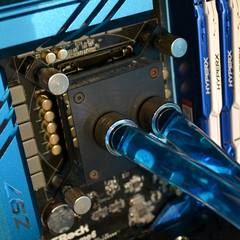-
Posts
123 -
Joined
-
Last visited
Reputation Activity
-
 Nite-Ninja got a reaction from instagram in (Help) HP Omni 10 Tablet - Atom Z3770 and Throttling
Nite-Ninja got a reaction from instagram in (Help) HP Omni 10 Tablet - Atom Z3770 and Throttling
Greetings all. I've ran out of options. I have an old HP Omni 10 tablet running Windows 10. Its got a Intel Atom Bay Trail Z3770. All things considered, its still a great tablet.
Now the problem I am having is, this machine thermal throttles, hard. But its not actually thermal throttling. At most I see it getting into the 70C range under load in AIDA64. Running AIDA64 stress test though, doesn't trigger it to "thermal throttle." However if I try to do any kind of multitasking, or play something as light as Bejeweled 3 or something, the thermal throttle line will peg to 100% and the CPU will downclock to 0.53ghz, and stay there until I restart the PC.
I've tried using throttlestop to disable things like the turbo boost, undervolt it, etc. I've used registry edits to change the minimum processor state, but no avail there either. I have attached an image, I played Bejeweled 3 for about a minute before that thermal throttle line started, and when the game ran slow I stopped it to take the picture. But I've replicated it doing simple things such as opening a web browser or Windows Explorer
I don't want to give up on this tablet yet. I've even tried installing Ubuntu on it, but it won't boot from USB, which I'm sure that's a separate issue.
Any help or things to try will be greatly appreciated. I'm currently typing this on the tablet (using an external keyboard), and I type faster than it can put in the letters haha.
-
 Nite-Ninja got a reaction from johnukguy in Two routers, one is cable modem best way to use both?
Nite-Ninja got a reaction from johnukguy in Two routers, one is cable modem best way to use both?
If you're worried about the load on the router provided by your ISP, you can just use that for your in-home security system, and run a patch cable from the ethernet port on the ISP router/modem to your new router. Then you can turn off the SSID broadcasting for the ISP router and have all the traffic using the dedicated router.
Last thing you'd want to do is overload the router in control of your security system and some night someone breaks in, but oops, your router needed to be rebooted.
-
 Nite-Ninja got a reaction from ExplosiveSloths in Help Decide which Laptop To buy (need lots of RAM)
Nite-Ninja got a reaction from ExplosiveSloths in Help Decide which Laptop To buy (need lots of RAM)
Something else to consider, they just released a new Ryzen 7 1700 laptop, touting 8 cores 16 threads, which will help you with productivity alot, without busting the wallet.
Its the ASUS ROG Strix GL702ZC. Ships with 16gb, expandable to 32.
$1,500.
I probably should explain more of its features.
Its got a R7 1700 at 3ghz, turboing up to 3.7ghz with no thermal throttling, a 4gb RX 580, a nice 17.3" IPS display with great viewing angles, 256gb SSD and 1TB HDD. I'm looking to get my hands on one of these and see what else it can do. It has a pleasant mix of gamer and professional look, and isn't excessively heavy or use an excessive amount of power, with about 5 hours of battery life.
-
 Nite-Ninja got a reaction from ARikozuM in Tesla Unveils - Semi Truck and next-gen Roadster
Nite-Ninja got a reaction from ARikozuM in Tesla Unveils - Semi Truck and next-gen Roadster
As a long haul trucker of 6 years, and now I drive 441 miles every night in my local route, theres a few things good and bad about the electric truck that would concern me, and probably start a forum war since I'm a person with opposing views.
The Design
That truck, has too much aerodynamics. With the trailer as low as it is, you would high-center it on even the smallest bumps on the road, let alone a railroad track. They're making trailers now with "skirts" under them, and they're constantly hitting varying changes in terrain. Even a steep enough slope (lets say coming out of the walmart parking lot to the main road) would cause the rear end to scrape the ground and even tear something off.
Airflow to braking components. Thats another drawback of even the current minuscule aerodynamics trailers have now, the brakes under load, such as descending a large hill, will heat up much faster, and "smoke". Many truckers use the mechanical engine brake to help provide more braking power to the drive train to help slow the truck down. Electric regenerative braking could help to a certain degree, but you would need to rely on mechanical brakes to control a 40-ton vehicle descending a 7%+ grade. With very little air resistance, that truck wouldn't have much stopping it either.
There needs to be a gap between the trailer and the tractor. Unless the kingpin automatically adjusts itself to allow the truck to turn, you will crush the fins on the side of the tractor in anything greater than a 50-60 degree turn. So you couldn't button hook or jug handle turns without causing a lot of damage.
And back to aerodynamics, tires get hot and rely on a certain degree of airflow to keep cool as well, so they'll need to look back at tire technology to help prevent this. Current truck tires are 24 inches in diameter, with 100 pounds per square inch of pressure. When one of those blows, you bet those little panels will become projectiles to a vehicle beside the truck.
The Execution
I have no doubt that in the future, electric vehicles will become more of a thing than what people are giving it credit for. But we're talking about trying to turn a vehicle that can burn 100 gallons of fuel in a 400-500 mile trip, into electric. The amount of battery technology will be absurd, not to mention the fire hazard from flash fires that failing batteries can cause. Diesel burns slow, and has a high ignition temperature (alot of people think Diesel is like Gasoline and can just spark spontaneously, but thats not the case).
The braking system would have to be all electric, probably one that would require power to keep the brake shoes away from the pads, that way in the event of a power loss, the brakes would slam down as air brakes do in a air system failure. An electric air system would also possibly work, but then you'd need even more systems in order to have the regenerative braking on all 18 wheels. The wiring would be nuts.
And this would never work in the climate I live in. With the amount of road salt and snow we have up here, the electrical system would corrode out of them in no time, not to mention the changing temperatures would be hell on the batteries. When I worked for Werner years ago, they tried using natural gas trucks to run their line hauls from Chicago to Omaha, and even with a full tank of natural gas, due to how natural gas loses pressure when its cold, they would need to refill in that small trip. I'm sure this would be alleviated with a controlled battery heater, but just like having the brakes suspended when powered, that would use more energy as well.
My Conclusion
Its a neat idea, but our infrastructure here in the United States is not ready for something like this. Especially their convoy mode, because we have traffic, lots of it. Even major freeways are clogged. And you'd imagine that most impatient drivers out there would do their damnest to cut off a convoy train of trucks. Motorists get angry around regular truckers as is since we're large slow moving road blocks in large volumes with somewhere to go. Everyone is in a hurry to gain that extra 5 seconds to their day.
I would however like to see this tech go into a hybrid truck. The most fuel used in a semi truck is accelerating, as even the newest trucks can get over 11-12mpg with average loads on average terrain (Source - Freightliner reviewing the 2018 Cascadia), but I'm sure that could be even better if the high torque abilities of electric motors helped get them to speed. Maybe even turn to electric power when coasting and rely on the diesel engine to climb hills. There are many ways that they could compromise on electric and diesel tech. After all, diesel engine tech and truck design has come a long way in a short time.
And if you read all this, you earned yourself a beer. If you're going to quote me to troll me, I'm taking that beer back
-
 Nite-Ninja got a reaction from AlwaysFSX in Tesla Unveils - Semi Truck and next-gen Roadster
Nite-Ninja got a reaction from AlwaysFSX in Tesla Unveils - Semi Truck and next-gen Roadster
As a long haul trucker of 6 years, and now I drive 441 miles every night in my local route, theres a few things good and bad about the electric truck that would concern me, and probably start a forum war since I'm a person with opposing views.
The Design
That truck, has too much aerodynamics. With the trailer as low as it is, you would high-center it on even the smallest bumps on the road, let alone a railroad track. They're making trailers now with "skirts" under them, and they're constantly hitting varying changes in terrain. Even a steep enough slope (lets say coming out of the walmart parking lot to the main road) would cause the rear end to scrape the ground and even tear something off.
Airflow to braking components. Thats another drawback of even the current minuscule aerodynamics trailers have now, the brakes under load, such as descending a large hill, will heat up much faster, and "smoke". Many truckers use the mechanical engine brake to help provide more braking power to the drive train to help slow the truck down. Electric regenerative braking could help to a certain degree, but you would need to rely on mechanical brakes to control a 40-ton vehicle descending a 7%+ grade. With very little air resistance, that truck wouldn't have much stopping it either.
There needs to be a gap between the trailer and the tractor. Unless the kingpin automatically adjusts itself to allow the truck to turn, you will crush the fins on the side of the tractor in anything greater than a 50-60 degree turn. So you couldn't button hook or jug handle turns without causing a lot of damage.
And back to aerodynamics, tires get hot and rely on a certain degree of airflow to keep cool as well, so they'll need to look back at tire technology to help prevent this. Current truck tires are 24 inches in diameter, with 100 pounds per square inch of pressure. When one of those blows, you bet those little panels will become projectiles to a vehicle beside the truck.
The Execution
I have no doubt that in the future, electric vehicles will become more of a thing than what people are giving it credit for. But we're talking about trying to turn a vehicle that can burn 100 gallons of fuel in a 400-500 mile trip, into electric. The amount of battery technology will be absurd, not to mention the fire hazard from flash fires that failing batteries can cause. Diesel burns slow, and has a high ignition temperature (alot of people think Diesel is like Gasoline and can just spark spontaneously, but thats not the case).
The braking system would have to be all electric, probably one that would require power to keep the brake shoes away from the pads, that way in the event of a power loss, the brakes would slam down as air brakes do in a air system failure. An electric air system would also possibly work, but then you'd need even more systems in order to have the regenerative braking on all 18 wheels. The wiring would be nuts.
And this would never work in the climate I live in. With the amount of road salt and snow we have up here, the electrical system would corrode out of them in no time, not to mention the changing temperatures would be hell on the batteries. When I worked for Werner years ago, they tried using natural gas trucks to run their line hauls from Chicago to Omaha, and even with a full tank of natural gas, due to how natural gas loses pressure when its cold, they would need to refill in that small trip. I'm sure this would be alleviated with a controlled battery heater, but just like having the brakes suspended when powered, that would use more energy as well.
My Conclusion
Its a neat idea, but our infrastructure here in the United States is not ready for something like this. Especially their convoy mode, because we have traffic, lots of it. Even major freeways are clogged. And you'd imagine that most impatient drivers out there would do their damnest to cut off a convoy train of trucks. Motorists get angry around regular truckers as is since we're large slow moving road blocks in large volumes with somewhere to go. Everyone is in a hurry to gain that extra 5 seconds to their day.
I would however like to see this tech go into a hybrid truck. The most fuel used in a semi truck is accelerating, as even the newest trucks can get over 11-12mpg with average loads on average terrain (Source - Freightliner reviewing the 2018 Cascadia), but I'm sure that could be even better if the high torque abilities of electric motors helped get them to speed. Maybe even turn to electric power when coasting and rely on the diesel engine to climb hills. There are many ways that they could compromise on electric and diesel tech. After all, diesel engine tech and truck design has come a long way in a short time.
And if you read all this, you earned yourself a beer. If you're going to quote me to troll me, I'm taking that beer back
-
 Nite-Ninja got a reaction from leadeater in Tesla Unveils - Semi Truck and next-gen Roadster
Nite-Ninja got a reaction from leadeater in Tesla Unveils - Semi Truck and next-gen Roadster
As a long haul trucker of 6 years, and now I drive 441 miles every night in my local route, theres a few things good and bad about the electric truck that would concern me, and probably start a forum war since I'm a person with opposing views.
The Design
That truck, has too much aerodynamics. With the trailer as low as it is, you would high-center it on even the smallest bumps on the road, let alone a railroad track. They're making trailers now with "skirts" under them, and they're constantly hitting varying changes in terrain. Even a steep enough slope (lets say coming out of the walmart parking lot to the main road) would cause the rear end to scrape the ground and even tear something off.
Airflow to braking components. Thats another drawback of even the current minuscule aerodynamics trailers have now, the brakes under load, such as descending a large hill, will heat up much faster, and "smoke". Many truckers use the mechanical engine brake to help provide more braking power to the drive train to help slow the truck down. Electric regenerative braking could help to a certain degree, but you would need to rely on mechanical brakes to control a 40-ton vehicle descending a 7%+ grade. With very little air resistance, that truck wouldn't have much stopping it either.
There needs to be a gap between the trailer and the tractor. Unless the kingpin automatically adjusts itself to allow the truck to turn, you will crush the fins on the side of the tractor in anything greater than a 50-60 degree turn. So you couldn't button hook or jug handle turns without causing a lot of damage.
And back to aerodynamics, tires get hot and rely on a certain degree of airflow to keep cool as well, so they'll need to look back at tire technology to help prevent this. Current truck tires are 24 inches in diameter, with 100 pounds per square inch of pressure. When one of those blows, you bet those little panels will become projectiles to a vehicle beside the truck.
The Execution
I have no doubt that in the future, electric vehicles will become more of a thing than what people are giving it credit for. But we're talking about trying to turn a vehicle that can burn 100 gallons of fuel in a 400-500 mile trip, into electric. The amount of battery technology will be absurd, not to mention the fire hazard from flash fires that failing batteries can cause. Diesel burns slow, and has a high ignition temperature (alot of people think Diesel is like Gasoline and can just spark spontaneously, but thats not the case).
The braking system would have to be all electric, probably one that would require power to keep the brake shoes away from the pads, that way in the event of a power loss, the brakes would slam down as air brakes do in a air system failure. An electric air system would also possibly work, but then you'd need even more systems in order to have the regenerative braking on all 18 wheels. The wiring would be nuts.
And this would never work in the climate I live in. With the amount of road salt and snow we have up here, the electrical system would corrode out of them in no time, not to mention the changing temperatures would be hell on the batteries. When I worked for Werner years ago, they tried using natural gas trucks to run their line hauls from Chicago to Omaha, and even with a full tank of natural gas, due to how natural gas loses pressure when its cold, they would need to refill in that small trip. I'm sure this would be alleviated with a controlled battery heater, but just like having the brakes suspended when powered, that would use more energy as well.
My Conclusion
Its a neat idea, but our infrastructure here in the United States is not ready for something like this. Especially their convoy mode, because we have traffic, lots of it. Even major freeways are clogged. And you'd imagine that most impatient drivers out there would do their damnest to cut off a convoy train of trucks. Motorists get angry around regular truckers as is since we're large slow moving road blocks in large volumes with somewhere to go. Everyone is in a hurry to gain that extra 5 seconds to their day.
I would however like to see this tech go into a hybrid truck. The most fuel used in a semi truck is accelerating, as even the newest trucks can get over 11-12mpg with average loads on average terrain (Source - Freightliner reviewing the 2018 Cascadia), but I'm sure that could be even better if the high torque abilities of electric motors helped get them to speed. Maybe even turn to electric power when coasting and rely on the diesel engine to climb hills. There are many ways that they could compromise on electric and diesel tech. After all, diesel engine tech and truck design has come a long way in a short time.
And if you read all this, you earned yourself a beer. If you're going to quote me to troll me, I'm taking that beer back
-
 Nite-Ninja got a reaction from MoonSpot in Tesla Unveils - Semi Truck and next-gen Roadster
Nite-Ninja got a reaction from MoonSpot in Tesla Unveils - Semi Truck and next-gen Roadster
As a long haul trucker of 6 years, and now I drive 441 miles every night in my local route, theres a few things good and bad about the electric truck that would concern me, and probably start a forum war since I'm a person with opposing views.
The Design
That truck, has too much aerodynamics. With the trailer as low as it is, you would high-center it on even the smallest bumps on the road, let alone a railroad track. They're making trailers now with "skirts" under them, and they're constantly hitting varying changes in terrain. Even a steep enough slope (lets say coming out of the walmart parking lot to the main road) would cause the rear end to scrape the ground and even tear something off.
Airflow to braking components. Thats another drawback of even the current minuscule aerodynamics trailers have now, the brakes under load, such as descending a large hill, will heat up much faster, and "smoke". Many truckers use the mechanical engine brake to help provide more braking power to the drive train to help slow the truck down. Electric regenerative braking could help to a certain degree, but you would need to rely on mechanical brakes to control a 40-ton vehicle descending a 7%+ grade. With very little air resistance, that truck wouldn't have much stopping it either.
There needs to be a gap between the trailer and the tractor. Unless the kingpin automatically adjusts itself to allow the truck to turn, you will crush the fins on the side of the tractor in anything greater than a 50-60 degree turn. So you couldn't button hook or jug handle turns without causing a lot of damage.
And back to aerodynamics, tires get hot and rely on a certain degree of airflow to keep cool as well, so they'll need to look back at tire technology to help prevent this. Current truck tires are 24 inches in diameter, with 100 pounds per square inch of pressure. When one of those blows, you bet those little panels will become projectiles to a vehicle beside the truck.
The Execution
I have no doubt that in the future, electric vehicles will become more of a thing than what people are giving it credit for. But we're talking about trying to turn a vehicle that can burn 100 gallons of fuel in a 400-500 mile trip, into electric. The amount of battery technology will be absurd, not to mention the fire hazard from flash fires that failing batteries can cause. Diesel burns slow, and has a high ignition temperature (alot of people think Diesel is like Gasoline and can just spark spontaneously, but thats not the case).
The braking system would have to be all electric, probably one that would require power to keep the brake shoes away from the pads, that way in the event of a power loss, the brakes would slam down as air brakes do in a air system failure. An electric air system would also possibly work, but then you'd need even more systems in order to have the regenerative braking on all 18 wheels. The wiring would be nuts.
And this would never work in the climate I live in. With the amount of road salt and snow we have up here, the electrical system would corrode out of them in no time, not to mention the changing temperatures would be hell on the batteries. When I worked for Werner years ago, they tried using natural gas trucks to run their line hauls from Chicago to Omaha, and even with a full tank of natural gas, due to how natural gas loses pressure when its cold, they would need to refill in that small trip. I'm sure this would be alleviated with a controlled battery heater, but just like having the brakes suspended when powered, that would use more energy as well.
My Conclusion
Its a neat idea, but our infrastructure here in the United States is not ready for something like this. Especially their convoy mode, because we have traffic, lots of it. Even major freeways are clogged. And you'd imagine that most impatient drivers out there would do their damnest to cut off a convoy train of trucks. Motorists get angry around regular truckers as is since we're large slow moving road blocks in large volumes with somewhere to go. Everyone is in a hurry to gain that extra 5 seconds to their day.
I would however like to see this tech go into a hybrid truck. The most fuel used in a semi truck is accelerating, as even the newest trucks can get over 11-12mpg with average loads on average terrain (Source - Freightliner reviewing the 2018 Cascadia), but I'm sure that could be even better if the high torque abilities of electric motors helped get them to speed. Maybe even turn to electric power when coasting and rely on the diesel engine to climb hills. There are many ways that they could compromise on electric and diesel tech. After all, diesel engine tech and truck design has come a long way in a short time.
And if you read all this, you earned yourself a beer. If you're going to quote me to troll me, I'm taking that beer back
-
 Nite-Ninja got a reaction from t33to in Friend wants to build a new gaming machine, need part advice.
Nite-Ninja got a reaction from t33to in Friend wants to build a new gaming machine, need part advice.
This really depends on his budget and a few factors; like right now its pretty expensive to get budget GPU's (like the RX series from AMD), and RAM is really expensive. If he has a nice kit of DDR3 RAM on hand, might be more cost effective to use a 4th generation CPU like the 4790K (or the i5 equivalent) on a Z97 motherboard.
If cost isn't an issue, the 7th gen Kaby Lake i5's will be great, and theres tons of options for customizing.
I'm sure if you drop in a budget, people will be more than happy to throw some part picker ideas your way.
-
 Nite-Ninja got a reaction from TomvanWijnen in Ever wondered how cool your computer would be outside in the Winter?
Nite-Ninja got a reaction from TomvanWijnen in Ever wondered how cool your computer would be outside in the Winter?
Well here you go.
Its about -8C with -22C wind chills here in Southern Wisconsin, not the coldest but its certainly not warm. The heater inside my truck has failed and its pleasently chilly in here. Some of you know that I built a computer designed to handle the harshness of the road, while still bolstering high end computer components. I have my rig in my profile for those who don't, and maybe tell my story somewhere on the forum.
If I wasn't under 3 layers of blankets, I'd say this is prime for some super overclocking challenges! Couldn't get much colder without throwing the computer up on the roof, with the panels open to the wind.
Now time to play some Grand Theft Auto 5 to warm things up in here.
-
 Nite-Ninja got a reaction from Samsterstorm in My PC keeps crashing.. Tried everything I could think of
Nite-Ninja got a reaction from Samsterstorm in My PC keeps crashing.. Tried everything I could think of
It's possible. Dirty wall power can add small inconsistencies and cause it to malfunction, as well as additional CPU pull from background applications updating or doing their thing.
-
 Nite-Ninja got a reaction from joppetie in My PC keeps crashing.. Tried everything I could think of
Nite-Ninja got a reaction from joppetie in My PC keeps crashing.. Tried everything I could think of
You can get power supply testers, basic units for $7 and more advanced ones for up to $30, so if you don't have a spare PSU sitting around to test with, this would be a good way to isolate power delivery.
-
 Nite-Ninja got a reaction from Samsterstorm in My PC keeps crashing.. Tried everything I could think of
Nite-Ninja got a reaction from Samsterstorm in My PC keeps crashing.. Tried everything I could think of
You can get power supply testers, basic units for $7 and more advanced ones for up to $30, so if you don't have a spare PSU sitting around to test with, this would be a good way to isolate power delivery.
-
 Nite-Ninja got a reaction from EdInk in Help i can't overclock i5 4690k on Asrock H97M ITX / ac
Nite-Ninja got a reaction from EdInk in Help i can't overclock i5 4690k on Asrock H97M ITX / ac
Asus has unlocked CPU modifiers on their H series boards, so check up on your BIOS updates because when one company does something, the rest usually jump onboard.





.thumb.jpg.94f4ebc6714f0921314e56fdba4a05bf.jpg)





